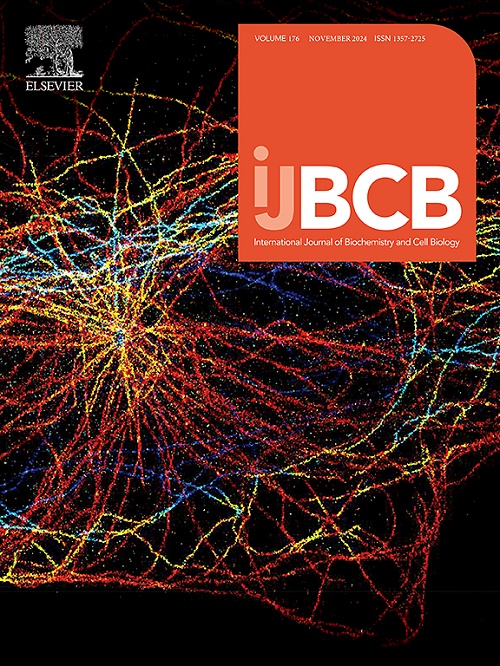线粒体稳态及其对胃癌的影响。
IF 2.8
3区 生物学
Q2 BIOCHEMISTRY & MOLECULAR BIOLOGY
International Journal of Biochemistry & Cell Biology
Pub Date : 2025-07-03
DOI:10.1016/j.biocel.2025.106827
引用次数: 0
摘要
胃癌是世界上第五大确诊癌症和第三大癌症相关死亡原因。线粒体功能障碍,伴随着能量产生的受损和氧化应激的增加,促进了胃肿瘤的发展。胃癌表现出线粒体功能失调,导致代谢重编程、细胞凋亡敏感性降低、治疗抵抗、肿瘤进展和转移加快。此外,线粒体DNA、呼吸链复合物和表观遗传改变的畸变促进了致瘤微环境的形成。虽然在了解胃癌发生的各种分子机制方面已经取得了重大进展,但还需要进一步的研究来阐明胃癌中的线粒体稳态。解开胃癌中线粒体的复杂性可以打开最终诊断和治疗干预措施的发展,推动肿瘤生长。本文就胃癌中线粒体功能的改变进行综述。本文章由计算机程序翻译,如有差异,请以英文原文为准。
Mitochondrial homeostasis and their impact on gastric carcinoma
Gastric cancer is the fifth most diagnosed cancer and the third most common cause of cancer-related deaths worldwide. Mitochondrial dysfunction, with its impaired energy production and increased oxidative stress, fuels the development of gastric tumours. Gastric cancer exhibits dysregulated mitochondrial functions, which contribute to metabolic reprogramming, decreased apoptosis sensitivity, therapeutic resistance, and enhanced tumour progression and metastasis. In addition, aberrations in mitochondrial DNA, respiratory chain complexes, and epigenetic alterations foster a pro-tumorigenic microenvironment. Although significant progress has been made in understanding the various molecular mechanisms involved in gastric carcinogenesis, further studies are needed to elucidate mitochondrial homeostasis in gastric cancer. Unravelling mitochondrial intricacies in gastric cancer could open the development of definitive diagnostic and therapeutic interventions driving tumour growth. This review focuses on investigating the altered mitochondrial functionalities in gastric cancer.
求助全文
通过发布文献求助,成功后即可免费获取论文全文。
去求助
来源期刊
CiteScore
8.10
自引率
0.00%
发文量
124
审稿时长
19 days
期刊介绍:
IJBCB publishes original research articles, invited reviews and in-focus articles in all areas of cell and molecular biology and biomedical research.
Topics of interest include, but are not limited to:
-Mechanistic studies of cells, cell organelles, sub-cellular molecular pathways and metabolism
-Novel insights into disease pathogenesis
-Nanotechnology with implication to biological and medical processes
-Genomics and bioinformatics

 求助内容:
求助内容: 应助结果提醒方式:
应助结果提醒方式:


